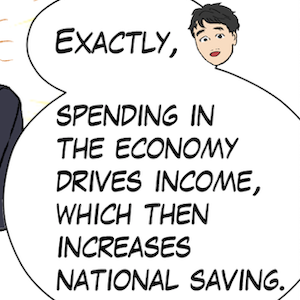The Smith Family manga continues – Episode 8 is now available
Episode 8 in our new Manga series – The Smith Family and their Adventures with Money – is now available. Have a bit of fun with it and circulate it to those who you think will benefit …
No discernible negative Brexit impact on British tourism so far
If you cast your mind back to 2016 and after in Britain, there were a series of shock horror predictions being made about the impact on the nation of leaving the European Union. The scaremongering didn’t dissaude the voters and the Referendum was determined in favour of leaving. It seems I lost some friends as a result of my support for the Yes vote – although in saying that one has to question the basis of the relationships in the first place. Most of the doomsaying predictions have not materialised although it is very hard to conduct research convincingly on this topic given that the Tory government has been so incompetent and that the World has lived through one of the greatest disruptions in human history (aka Covid). But I was looking at the most recent data released by the British Office of National Statistics on December 19, 2023 covering – Overseas travel and tourism, provisional: September 2023 – and it reminded me of the predictions that tourism from Europe would collapse and British people would find it hard having holidays on the Continent after Brexit. The data says that the prediction was like many – guff.
The parallel universe in Japan continues and is delivering superior outcomes, while the rest look on clueless
It’s Wednesday and I have some commitments in Melbourne (recording a podcast with the Inside Network) and that requires some travel. So time is tight. Today, I update the latest from Japan courtesy of yesterday’s release from the Bank of Japan of its ‘Statement on Monetary Policy’. The parallel universe continues and is delivering superior outcomes, while the rest of the world’s policy makers, smitten with neoliberal nonsense, have their heads in the sand and the economies are turning to dust. I also provide some links to the video recording of the launch of the Japanese version of Reclaiming the State, which was held in Kyoto in November 2023. And I provide some links to a major article that I was featured in with one of Japan’s leading magazines. And if that isn’t enough, we have Voodoo Child.
The shift to the Right among the weak and powerful is a sign that mainstream economic thinking has failed
The – Australian Election Study (AES) – is the “leading study of political attitudes and behaviour in Australia” and has been running for 35 years. It provides a great time series for investigating electoral trends. The most recent analysis covers the period of the most recent federal election (May 2022). The data shows that Labor Party, which is currently in government has dramatically lost primary vote support over the period covered by the data and in particular among the younger voters. A similar trend is observed for the Coalition conservative parties. There is also strong evidence that ‘rusted on’ is no longer a thing among young voters. The proportions of ‘lifetime voting’ for either major party has fallen dramatically. While the Greens have benefitted from this shift in young voting patterns, there is evidence, which is also resonating globally, that young people are increasingly being attracted to what we term ‘far right’ political voices. That is, where the organised Left has failed. Young progressive minds are deserting the traditional progressive political institutions. Part of this reflects the failure of mainstream economics. The other part reflects the insecure being lured by influential characters who are increasingly embracing right agendas (for various reasons).
Australian labour market – unemployment rises as participation rises despite strong employment growth
Today (December 14, 2023), the Australian Bureau of Statistics released the latest – Labour Force, Australia – for November 2023. Employment growth remains strong with a surprise uptick in full-time employment. With participation rising by 0.2 points, the increase in the labour force outstripped the strong employment change, which meant that the unemployment rose by 0.1 points. If the participation rate had not have changed, then the official unemployment rate would be 3.5 per cent rather than the official rate published of 3.9 per cent. Underemployment also rose – there are now 10.4 per cent of the available and willing working age population who are being wasted in one way or another – either unemployed or underemployed. Australia is not near full employment despite the claims by the mainstream commentators and it is hard to characterise this as a ‘tight’ labour market.
Central banks and climate change
Today, I discuss a recent paper from the Bank of Japan’s Research and Studies series that focused on how much attention central banks around the world give to climate change and sustainability and how they interpret those challenges within their policy frameworks. The interesting result is that when there is an explicit mandate given to the central bank to consider these issues, the policy responses are framed quite differently and are oriented towards solutions, whereas otherwise, the narratives are about how climate change will impact on inflation. In the latter case, the central banks do not see their role as being part of the solution. Rather, they threaten harsher monetary policy action to deal with inflation. I also consider the most recent US inflation data. Finally, some live music from my time in Kyoto this year.
US labour market – no sign of a major slowdown underway
Last Friday (December 8 , 2023), the US Bureau of Labor Statistics (BLS) released their latest labour market data – Employment Situation Summary – November 2023 – which showed payroll employment rising by 199,000 which is a good sign. The unemployment rate also fell as employment growth outstripped the growth in the labour force – down to 3.7 per cent (from 3.9 per cent). The participation rate rose by 0.1 point, indicating optimism among workers. I see no sign of a major slowdown emerging. Real wages have also started rising – modestly.
Letter from The Cape Podcast – Episode 20
![]()
Episode 20 of my – Podcast – Letter from The Cape – is now available. Coming today from The Cape, Victoria, Australia.
The Smith Family manga continues – Episode 7 is now available
Episode 7 in our new Manga series – The Smith Family and their Adventures with Money – is now available. Have a bit of fun with it and circulate it to those who you think will benefit …


